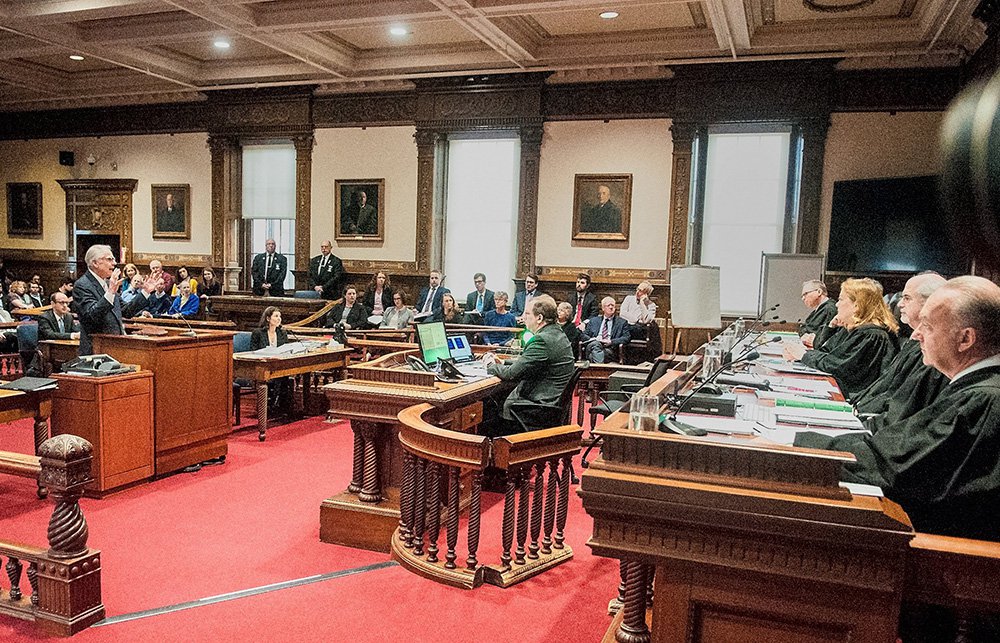Maine not ready for ranked choice
In the ongoing debate over ranked-choice voting, I’m reminded of the old saying: “The first casualty, when war comes, is truth.”
While we are not in a war, the truth does seem to have taken a back seat among supporters of ranked-choice voting, particularly their claim that the Maine Legislature has ignored the will of the people.
Nothing could be further from the truth. In fact, the bill that the Maine Legislature passed during the recent special session is designed to accommodate those who support ranked-choice voting. However, in order to do that, this style of voting first has to be lawful under the Maine Constitution. As it stands now, according to the Maine Supreme Court, it is not.
Let’s back up for a moment. In November 2016, Maine voters, by a narrow margin, approved a ranked-choice voting system that allows voters to rank multiple candidates in order of preference. If no candidate receives a majority, the candidate with the fewest first choices is eliminated and voters who liked that candidate the best have their ballots counted for their second choice.
The theory behind this convoluted voting system is that the eventual “winner” gets a majority of votes, even if they, in reality, only won a plurality of votes.
But there was a problem with Maine’s approval of ranked-choice voting, and it was a big one: It’s unconstitutional. In an advisory opinion that followed approval of the referendum, the court ruled that the Maine Constitution clearly states that candidates for Maine offices may be elected with a plurality of the vote. They are not required to get a majority.
It is not a partisan issue; criticism of ranked-choice voting has come from Republicans and Democrats.
Before ranked-choice voting went to the voters, it was presented as a bill to the Legislature. At that time, Attorney General Janet Mills, a Democrat, indicated it was, indeed, unconstitutional. Regardless, ranked-choice voting supporters pushed ahead with the referendum process and succeeded in getting it on the November 2016 ballot.
They put the cart ahead of the horse, and that is what has led to the current mayhem surrounding the issue. What they needed to do was first go through the process of securing a constitutional amendment and then go ahead with their effort to incorporate ranked-choice voting. Instead, they chose to do the process in reverse.
During the special session, the Maine Senate and House of Representatives passed a reasonable law that keeps ranked-choice voting in place. However, implementation of it will be delayed until December 2021, giving supporters plenty of time to get a constitutional amendment passed. If they fail to do this, ranked-choice voting will be repealed.
If ranked-choice voting is such a great and popular idea, one would think that getting the constitutional amendment passed would be easy.
Now ranked-choice voting backers are planning another signature drive to force a referendum that would nullify the Legislature’s recent action and force the state to institute the system in time for next June’s primary election, despite its many flaws.
This would be a disaster, because, in addition to the constitutional issues, there are other problems that make ranked-choice voting not ready for prime time.
Maine Secretary of State Matt Dunlap, also a Democrat, has raised concerns about the many logistical problems the voting system would create. For example, how would the statewide voting results, which have to be entered into a computer program to determine the winner, be tabulated? How long would it be before Mainers knew the results of a race? Days? Weeks? Months? What happens if there are requests for recounts, which happens nearly every election cycle; how do the recount results affect the ranked-choice formula? As it stands now, the Secretary of State’s Office lacks the rulemaking ability and funding to address these problems.
Maine is unequipped to answer these questions, yet ranked-choice voting supporters seem intent on going full steam ahead with it anyway.
Ranked-choice advocates have also made the case that nothing in the Maine Constitution prevents us from using the system for state primary races and federal congressional contests. But I, for one, cannot imagine the confusion associated with subjecting Maine voters with two different voting systems when they go into the booth.
No matter how you look at it, Maine is not ready for ranked-choice. Supporters of the system now have four years to go through the correct procedure to get this right. In the meantime, Maine citizens should not be subjected to the chaos that would result from implementing it now.
Ron Collins of Wells, a Republican, represents Senate District 34 in the Legislature.
Send questions/comments to the editors.



Comments are no longer available on this story